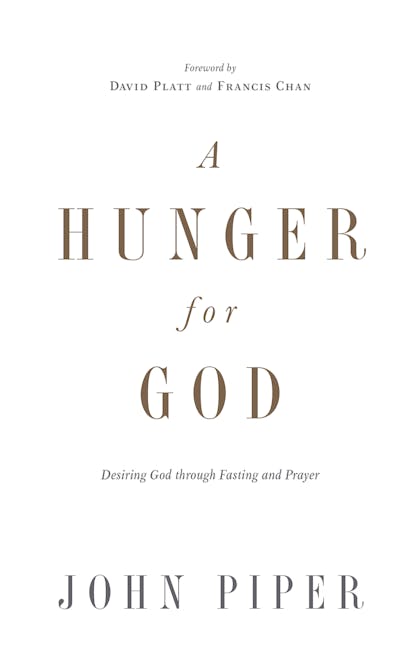Foreword to the New Edition of ‘A Hunger for God’
As we look out at the church today, there is so much that encourages us and fills us with gratitude. There is renewed zeal among God’s people for the spread of God’s glory across the earth. Like never before we hear brothers and sisters in different circles and different streams of contemporary Christianity talking about the gospel and mission, about transforming cities and reaching unreached people groups. These conversations are essential, and we hope they will continue with even greater intensity and intentionality in the days ahead.
But sometimes what we are not hearing can be as illuminating as what we do hear. It reminds us of an exchange in an old Sherlock Holmes mystery, where Holmes refers to “the curious incident of the dog in the night-time” during a robbery. A fellow detective, confused at Holmes’s comment, responds that “the dog did nothing in the nighttime” — to which Holmes responds: “That was the curious incident.” Despite the proliferation of Christian publishing and Christian conferences, J. I. Packer’s observation of our own curious incident still rings true:
When Christians meet, they talk to each other about their Christian work and Christian interests, their Christian acquaintances, the state of the churches, and the problems of theology — but rarely of their daily experience of God.
Modern Christian books and magazines contain much about Christian doctrine, Christian standards, problems of Christian conduct, techniques of Christian service — but little about the inner realities of fellowship with God.
Our sermons contain much sound doctrine — but little relating to the converse between the soul and the Saviour.
We do not spend much time, alone or together, in dwelling on the wonder of the fact that God and sinners have communion at all; no, we just take that for granted, and give our minds to other matters.
Thus we make it plain that communion with God is a small thing to us.
Think about it. Where are the passionate conversations today about communing with God through fasting and prayer? We seem to find it easier to talk much of plans and principles for proclaiming the gospel and planting churches, and to talk little of the power of God that is necessary for this gospel to be proclaimed and the church to be planted.
If we really want to be a part of seeing disciples made and churches multiplied throughout North America and to the ends of the earth, we would be wise to begin on our knees.
It is for this reason that we gladly commend the new edition of John Piper’s Hunger for God: Desiring God through Fasting and Prayer. If you have read or heard anything from Piper, you know that he is rightly and biblically passionate about the spread of God’s glory. But at the same time, he is acutely and biblically aware of our need for God’s grace. He knows that apart from dependence on and desperation for God, we will not only miss the ultimate point of our mission, but we will also neglect the ultimate need of our souls.
We were made to feast on God. In the words of the psalmist, we were created to cry:
O God, you are my God; earnestly I seek you;
my soul thirsts for you;
my flesh faints for you,
as in a dry and weary land where there is no water.
So I have looked upon you in the sanctuary,
beholding your power and glory.
Because your steadfast love is better than life,
my lips will praise you.
So I will bless you as long as I live;
in your name I will lift up my hands.
My soul will be satisfied as with fat and rich food. (Psalm 63:1–5)
We have read the sad statistics about the number of young people who turn away from the church once they are out of their parents’ home. We have heard people explain that they have “tried God” when they were young but that it didn’t work for them. But we have to wonder: did they “earnestly” seek him with their whole hearts? Did they cry out to him in fasting and prayer? Sometimes we “earnestly seek” after things from God rather than God himself. It is hard for us to imagine anyone leaving the presence of the living God — the maker and sustainer of heaven and earth — and looking for something better!
There is spiritual delight to be found in God that far supersedes the physical diet of this world, and fasting is the means by which we say to God, “More than our stomachs want food, our souls want you.” Once we “taste and see that the Lord is good” (Psalm 34:8), the things of the world no longer appeal to us in the same way.
As Piper says in the opening pages of this book, “Beware of books on fasting.” This is not a book of legalism. It’s not a book of technique. It does not contain a twelve-step plan. At the end of the day, it’s a book more about our hearts than about our stomachs. Abstaining from food (or other things) for a period of time is not an end in itself but a means to cause us to learn about and increase our love for Christ. As Piper explains in this book, the Bible gives us many reasons to fast:
We fast because we’re hungry for God’s Word and God’s Spirit in our lives.
We fast because we long for God’s glory to resound in the church and God’s praise to resound among the nations.
We fast because we yearn for God’s Son to return and God’s kingdom to come.
Ultimately we fast simply because we want God more than we want anything this world has to offer us.
Few things are as frustrating as trying to convince our loved ones of the greatness and grandeur of God. We are jealous for our neighbors and our faith family and the nations to find satisfaction in God alone. As we recently reread the book you hold in your hands, we have tried to imagine what it would be like if our churches were filled with believers fasting regularly and biblically. What might God be pleased to do if his church rises up to say, “This much, O God, we want you!”? We encourage you to read this book, asking great things from God, “who is able to do far more abundantly than all that we ask or think!” (Ephesians 3:20).

There is an appetite for God. And it can be awakened.
Between the dangers of self-denial and self-indulgence is the path of pleasant pain called fasting. It is the path John Piper invites you to travel in this book. For when God is the supreme hunger of your heart, he will be supreme in everything. And when you are most satisfied in him, he will be most glorified in you.





